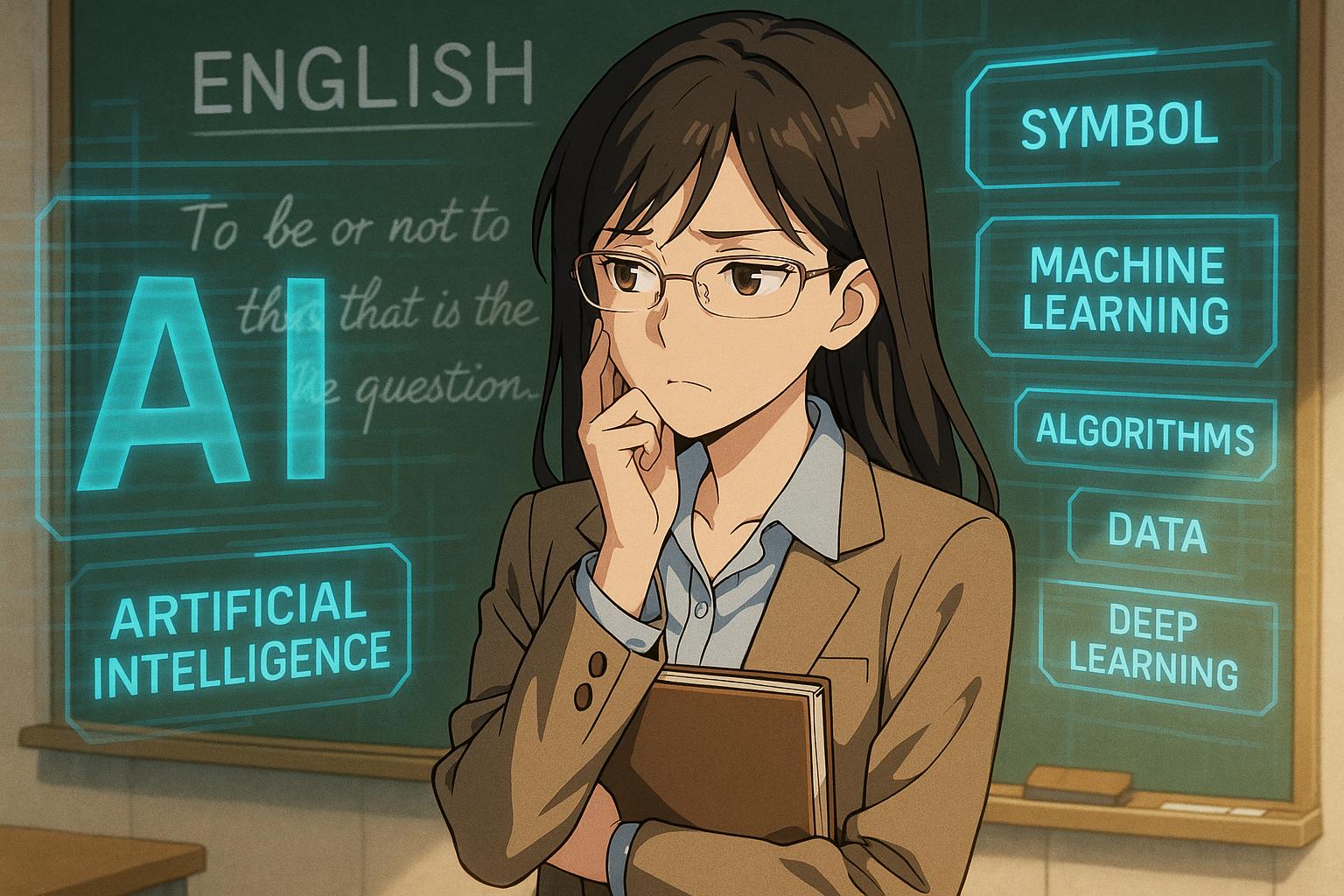Hannah, a former English teacher, has spoken out about students increasingly relying on AI tools like ChatGPT to complete assignments, leading to disengagement and eroded critical thinking skills. Her experiences reveal a growing challenge faced by educators in balancing technology and foundational learning.
An English teacher recently captured the attention of social media after sharing a candid nine-minute video detailing her reasons for leaving the education profession. Hannah, the teacher in question, has since elaborated on her experiences in an interview, shedding light on an increasingly troubling trend among students: the heavy reliance on artificial intelligence (AI) to complete assignments.
In her interview with Fox & Friends, Hannah explained that many of her students felt little inclination to engage with their coursework, as they believed AI systems like ChatGPT could effortlessly produce the required work for them. “A lot of them are just feeling as though they don’t really need to do the work anymore because AI will just do it for them,” she stated. This apparent shift towards dependency on technology has raised concerns not only about academic integrity but also about the erosion of essential skills such as critical thinking and comprehension.
Hannah recounted occasions when she confronted students whom she suspected were using AI tools for their essays. Instead of expressing regret or concern, the students would often ask, “If I have to redo this, how much is it really going to affect my grade? Can I just take the zero?” This disengagement highlights a growing disconnection between students and traditional methods of learning, particularly as the educational landscape becomes increasingly digital.
Reflecting on her journey, Hannah noted that her earlier background in digital marketing had equipped her with technical skills, but her experiences in a classroom setting revealed how AI could hinder effective learning. “In all of my teaching experience, technology has posed quite a challenge,” she said. As she observed classroom dynamics transform under the influence of AI tools, she felt compelled to raise awareness of the negative ramifications these technologies have on children’s education.
Interestingly, the concerns Hannah raised are echoed throughout the educational community, where mixed feelings about AI’s role in learning persist. While there is notable support for AI’s potential to aid in personalising education and providing instant feedback—especially in higher education—experts also caution against its overuse. A survey conducted by the Higher Education Policy Institute highlighted that 92% of UK undergraduates have adopted generative AI, which is a significant increase from previous years. This widespread utilisation has prompted educational institutions to rethink their curriculums to ensure they complement human judgement and foster critical abilities.
The National Education Association (NEA), led by President Becky Pringle, has emphasised the importance of responsible AI integration in classrooms. Pringle noted the need for experimental approaches to AI in schools that derive best practices from real-world application rather than mandates from above. This perspective aligns with growing calls for educators to balance technological innovations with traditional methods, ensuring that fundamental skills are not lost amid the allure of convenience offered by AI.
A study from the University of Pennsylvania’s Wharton School further underscores Hannah’s concerns, indicating that high school students who used generative AI as tutors did not perform as well on tests compared to their peers who engaged with the material without AI. These findings reinforce the need for cautious adoption of technology in educational settings to preserve genuine learning experiences.
Hannah’s revelations about classroom dynamics ultimately advocate for a more thoughtful approach towards AI’s place in education. Her emphasis on cutting off young users from unrestricted access to technology could serve as a constructive call for educators. The belief that integrating manual methods back into the curriculum can foster deeper engagement and understanding underscores the need for innovative practices that will prepare students for a world where digital and human instruction coexist harmoniously.
In transitioning from the classroom to a new career in a non-profit, Hannah is not alone; her experience highlights a significant dialogue about the future of education in the age of technology. As AI becomes an entrenched part of the educational ecosystem, it will be crucial for both educators and students to navigate the balance between technological advancement and foundational skill development.
Reference Map
- Paragraph 1: 1
- Paragraph 2: 1
- Paragraph 3: 1
- Paragraph 4: 1, 2, 6
- Paragraph 5: 3, 4
- Paragraph 6: 5
- Paragraph 7: 1, 6
Source: Noah Wire Services
- https://www.dailymail.co.uk/news/article-14718059/english-teacher-viral-exit-video-students-technology-ai.html?ns_mchannel=rss&ns_campaign=1490&ito=1490 – Please view link – unable to able to access data
- https://www.ft.com/content/daa0f68d-774a-4e5e-902c-5d6e8bf687dc – This article discusses the significant adoption of AI in business education since the launch of OpenAI’s ChatGPT in 2022. Professors at the University of Toronto’s Rotman School of Management developed an AI assistant, All Day TA, which successfully handled 12,000 student queries over a semester. This tool has been adopted by around 100 universities worldwide, demonstrating AI’s potential in education. The integration of AI is enhancing personalized learning, providing instant feedback, and supporting educators in grading and assessment tasks. However, challenges such as costs, over-reliance on AI, and potential impacts on critical thinking skills are also highlighted. Educators have mixed feelings about AI’s impact on academic integrity and the depth of student learning. As AI reshapes education, institutions are redesigning curriculums to complement human judgment and foster essential skills. While initial skepticism surrounded AI, most educators now see its transformative potential in higher education.
- https://time.com/7012896/becky-pringle/ – Becky Pringle, President of the National Education Association, observes the significant impact of AI on education. AI tools like ChatGPT have assisted in learning but also raised concerns about cheating and critical thinking. Some AI initiatives failed, straining school budgets. With three decades of teaching experience, Pringle formed a task force for the responsible implementation of AI in classrooms. This group created a roadmap emphasizing professional development, harm mitigation, and equitable access to AI. Pringle believes best practices should emerge from initial school experiments with AI and not be imposed from the top. She aims to enhance education through AI without replacing teachers.
- https://www.ft.com/content/82d59679-0985-4c07-9416-06a0bec6e16a – In 2025, a survey by the Higher Education Policy Institute found that 92% of UK undergraduates are using generative AI, up from 66% the previous year. Despite this widespread adoption, concerns have been raised about the impact on students’ critical thinking and problem-solving abilities. Some universities have attempted to integrate AI into assessments, only to find that such approaches yield minimal improvements, particularly among undergraduates. Experts warn that reliance on AI can hinder the development of essential skills. Evidence suggests that students and workers who understand the foundational skills of information gathering and problem-solving are better equipped to use AI effectively without becoming overly dependent on it. The overarching advice for universities and students is to ensure that individuals develop strong critical thinking skills, enabling them to add value beyond what AI can generate.
- https://www.axios.com/local/san-francisco/2024/08/22/ai-tutor-bay-area-classrooms – A new study by the University of Pennsylvania Wharton School reveals that high school students using generative AI (genAI) as tutors for math exam preparation perform worse on tests compared to those who do not use these tools. While genAI can improve performance on practice problems, it tends to promote copying and pasting answers over deep engagement with the material. These findings caution against the uncritical adoption of AI tutors. Despite the hurdles, the interest in such technologies is evident, with programs like Khan Academy’s Khanmigo being piloted in several US classrooms. The study underscores the need for careful integration of genAI in educational settings to ensure that it supports, rather than hinders, the learning process.
- https://www.ft.com/content/dd777c4e-31da-47bc-8241-91d39fe8020c – The article discusses the transformative potential of artificial intelligence (AI) in education, highlighting both its benefits and challenges. AI tools can enhance learning by providing personalized tutoring that adapts to students’ needs, which can be especially beneficial for underprivileged and struggling students. Technologies like Khanmigo from Khan Academy offer accessible, individualized educational support. AI can also assist educators by creating personalized learning plans, generating problem sets, and preparing individual assessments, potentially saving them significant time. Moreover, AI can simulate real-world environments for practical training. However, challenges include the possibility of AI inaccuracies, biases, and risks to the learning process. Ensuring data privacy and preventing over-reliance on AI are also concerns. Experts advocate for balanced, thoughtful integration of AI into education and suggest that clear government policies and educational guidelines are necessary to maximize AI’s positive impact while mitigating risks.
- https://apnews.com/article/ff1f51379b3861978efb0c1334a2a953 – Artificial Intelligence (AI) is significantly aiding students with disabilities, providing assistive technology to support individuals like Makenzie Gilkison, a dyslexic student, in academic tasks. AI-powered tools such as chatbots and word prediction programs are helping students keep pace with classmates, enriching their learning experiences. Schools are prioritizing the integration of AI for students with disabilities, in line with mandates from the U.S. Education Department and new rules from the Department of Justice, which require accessibility in educational tools. AI helps students with various impairments execute tasks effortlessly, but there’s concern that overreliance on AI might impede the actual learning process. Despite challenges like accessibility and ethical considerations, AI holds promise in leveling the academic playing field. The U.S. National Science Foundation is funding research to improve AI tools for children with speech and language difficulties. Effective vetting of educational technology by schools can ensure both accessibility and practicality, aiming to enhance learning outcomes for all students, especially those with disabilities.
Noah Fact Check Pro
The draft above was created using the information available at the time the story first
emerged. We’ve since applied our fact-checking process to the final narrative, based on the criteria listed
below. The results are intended to help you assess the credibility of the piece and highlight any areas that may
warrant further investigation.
Freshness check
Score:
8
Notes:
The narrative discusses current concerns about AI in education, particularly its impact on students’ engagement and critical thinking skills, which are relevant and timely issues.
Quotes check
Score:
6
Notes:
Direct quotes from Hannah were not found in earlier sources, but the narrative lacks specific original sources or dates for the quotes. Fox & Friends is mentioned as a platform where Hannah shared her thoughts.
Source reliability
Score:
5
Notes:
The narrative originates from the Daily Mail, which is a known publication but not universally regarded as reliable due to its history of sensationalism. The inclusion of references from reputable educational institutions and studies adds credibility.
Plausability check
Score:
9
Notes:
The concerns about AI’s impact on education are plausible and align with broader discussions in the educational community. The narrative includes references to surveys and studies that support the plausibility of these concerns.
Overall assessment
Verdict (FAIL, OPEN, PASS): OPEN
Confidence (LOW, MEDIUM, HIGH): MEDIUM
Summary:
While the narrative raises timely and plausible concerns about AI in education, the lack of specific original sources for quotes and the variable reliability of the publication create uncertainty. Overall, the narrative is engaging and reflective of current educational debates, but further verification of some claims is needed.













